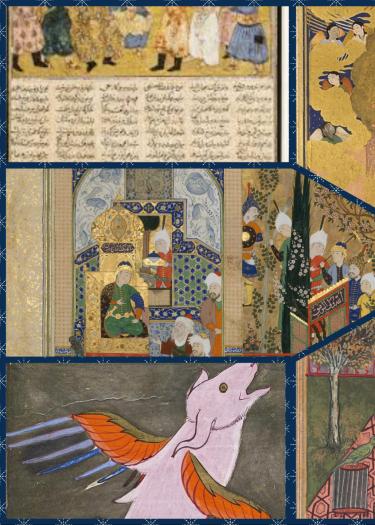Öffentliche Vorlesung From Fish to Moon: Traveling with the Nāmā across Plural Literary Cultures of Asia
- Date in the past
- Friday, 17. May 2024, 14:15 - 15:45
- Centre for Asian and Transcultural Studies, CATS Auditorium, Raum 010.01.05, Gebäude 4130, Voßstraße 2, 69115 Heidelbergg
- Prof. Dr. Ipshita Chanda, English and Foreign Languages University, Hyerabad (Indien), Department of Comparative Literature
The nāmā is a text-name that traverses various forms of textual process spanning literally from fish to the moon, mimicking the wondrous journey of the Prophet in Farid-ud-din Attar’s Ilāhī-Nāmah (Book of God). This common text-name originates in the cultures of west Asia and enters the Indian subcontinent through contact with Islamicate cultures from Ghazna to Turkestan. This talk will explore the structuring effect that any text-name, generic markers, and repertoires of signification may have upon literary construction, undertaking our journey with the namah in the spirit of willing engagement with difference, not caring too much about the boundaries, borders, and identitarian studies that current literary theorizing seems to be concerned about.

Address
Centre for Asian and Transcultural Studies
CATS Auditorium, Raum 010.01.05
Gebäude 4130, Voßstraße 2
69115 HeidelbergOrganizer
Event Type
Talk
About Ipshita Chanda
Professor Ipshita Chanda is the head of the Department of Comparative Literature at the English and Foreign Languages University in Hyderabad, India. She is the author of Packaging Freedom: Feminism and Popular Culture; Reception of the Received: A Case Study in Inter-Systemic Literary Reception; Tracing the Charit as a Genre; Selfing the City: Single Women Migrants and their Lives in Kolkata etc. Besides being a prolific translator of Indian literatures, having translated the works of Sukumar Ray, Mahashweta Devi, Satinath Bhaduri, and Phanishwar Nath Renu, she also has multiple edited volumes to her credit, including Literary Historiography; Locating Cultural Change: Theory, Method, Process; Shaping the Discourse: Women’s Writings in Bengali Periodicals 1865-1947 (with Jayeeta Bagchi); Emotion, Expression and Aesthetics; and Literature and the Other Arts.